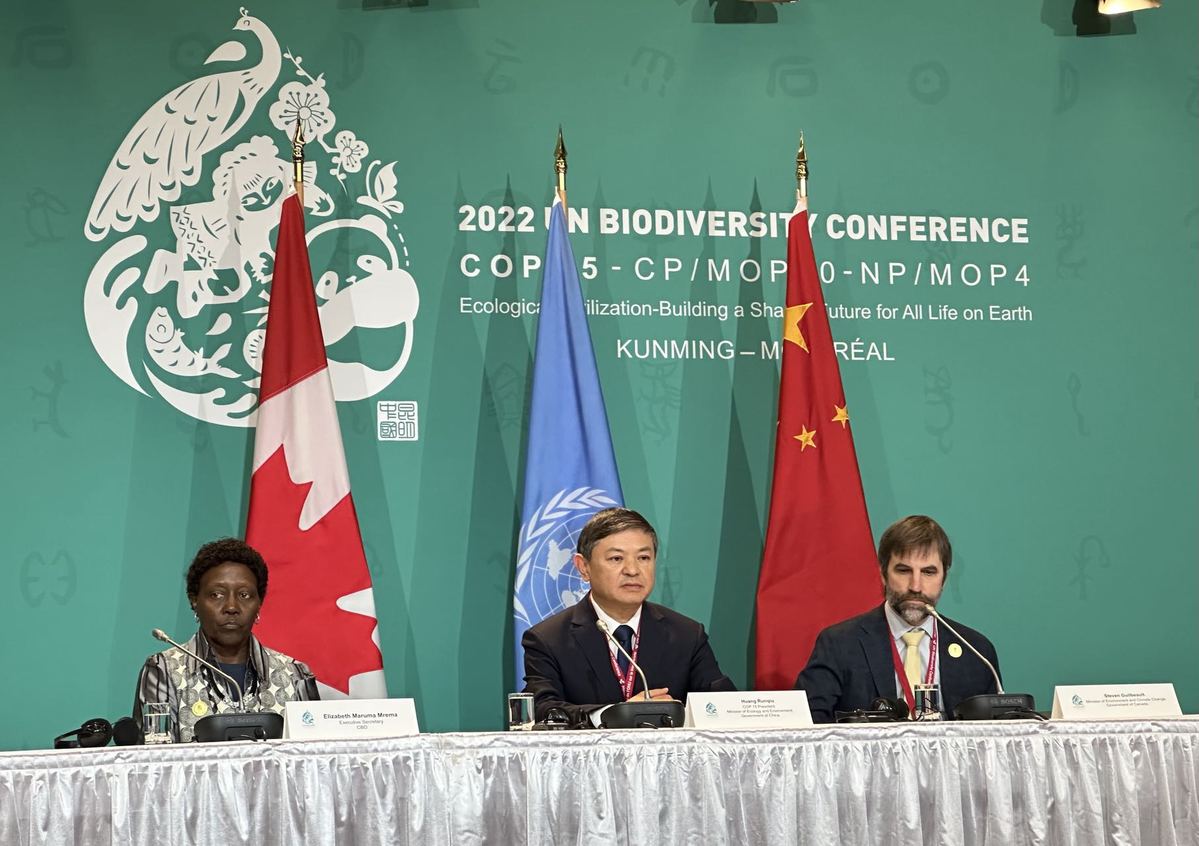COP15: Officials confident of major deal to save nature
By LIU YINMENG in Montreal | chinadaily.com.cn | Updated: 2022-12-19 07:19

With two days to go before the world's biggest global biodiversity conference ends, officials said they remain confident that parties could secure a deal for managing nature through 2030.
"We have taken solid steps towards success," Huang Runqiu, COP15 president and China's minister of ecology and environment, told reporters as the COP15's high-level segment ended Saturday.
Based on the information he has learned, everyone hopes to reach the "framework", Huang said. "They don't want to go home with nothing. They want to put something in their pockets and return home for Christmas. This is the common wish of all parties," Huang added.
As the negotiation continues, a few difficult issues remain. Next, the parties will focus on a very small number of challenging issues. The framework can be reached once these are resolved, he said.
"I am quite confident that we can finish this meeting with our goals accomplished," Huang said.
Environmental ministers from around the world on Thursday joined the UN biodiversity talks. The three-day session is a key phase of the two-week conference in Montreal to resolve any outstanding issues before parties could reach a new agreement by Dec 19.
"During the conference, ministers expressed the strong political will of countries to reverse the global biodiversity losses through speeches and pledges," said Huang.
More than 1,000 people, including 140 parties to the Convention on Biological Diversity (CBD), 200 minister-level delegates and 60 representatives from international organizations convened at the closing ceremony of the COP15's high-level segment Saturday.
Huang said ministers have agreed on the need to adopt changes in areas such as productions, consumption, and trade, in addition to establishing a scientific way to measure "the true costs" of economic activities on nature capitals.
President Xi Jinping attended the high-level segment's opening ceremony via video, Huang said. During his speech, Xi called for a global consensus on biodiversity conservation and encouraged delegates at the COP15 to "put ambitions into practices" by supporting developing countries to overcome biodiversity losses.
"President Xi's speech has demonstrated to the world China's firm determination to promote the process of global biodiversity governance," Huang said.
Canadian Environment Minister Steven Guilbeault said he is confident that "consensus is possible", adding "we can come together on the key remaining issues before us. We did it in Paris. We can do it here in Montreal," he said.
Guilbeault noted that the negotiators are making progress on key targets, including on resource mobilization.
"I didn't think that all these things would be possible. I was dreaming about them six months ago, but did I think that they were within reach? I wasn't sure, and thanks to the excellent work of our presidency, his team, and the great collaboration with the secretariat, and obviously, the collaboration of all parties. We are getting there," he said.
Elizabeth Maruma Mrema, executive secretary of the Convention on Biological Diversity (CBD), said she is "personally encouraged" by the progress made by the negotiations and the commitments that countries have made so far. "But negotiating teams still have work to do. They need to turn the promises made into plans, ambitions, and actions," she said.
Huang said he invited pairs of ministers to lead consultations on three difficult issues, namely, resource mobilization, digital sequence information (DSI), and other key remaining issues of the global biodiversity framework.
Each pair is consisted of one minister from a developing country and one from a developed nation. Rwanda and Germany teamed up to direct the dialogue on resource mobilizations. Norway and Chile oversaw the discussions on DSI.
Egypt and Canada worked together on the other key issues, Huang said. "With their leadership, we have achieved a lot of consensuses," he said.
























